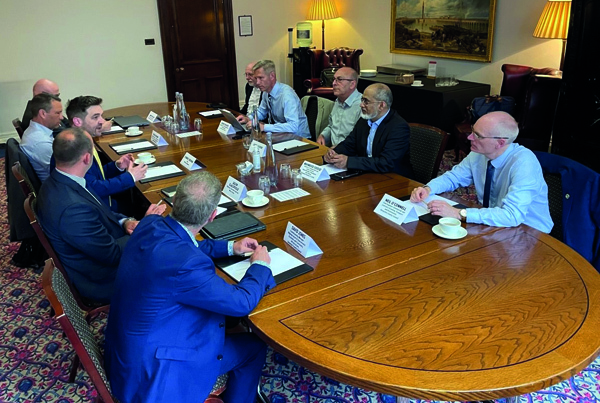A Highways round table, in partnership with Norse Group, saw prominent industry figures discuss the challenges of roads contracting. Operating under the Chatham House Rule, the discussion produced incredible insights and illuminating analysis into the challenges, options and opportunities of modern procurement.
The Norse Group is wholly owned by Norfolk CC and, as a contracting authority, is allowed to use Teckal rules to form joint ventures with local authorities, without going through a formal procurement process.
Under this system, a limited company is set up, shares are distributed between the local authority and Norse, the services and people are transferred to the new joint venture and Norse invests to bring the service up to speed.
Norse has been in business for about 20 years and has set up around 30 of these joint ventures, but has only just entered the highways market, recently creating a partnership arrangement with Norfolk CC itself.
As a new entrant, and having seen the market shift considerably in recent years, Norse teamed up with Highways to understand more about where we stand with contracting.
For a start, Norse notes that over 10 years ago one of the main attractions of its service model was its efficiency and money-saving potential. In the last few years, the selling point has shifted and become much more about control and flexibility.
In the partnership model, there is a board of directors with representation from the council, which steers the company, meaning service levels, financial arrangements and policies can be changed without the protracted negotiations with private contractors.
Another key selling point is the joint venture's ability to trade. About 65% of Norse's turnover comes from joint ventures and directly from Norfolk CC, while the other 35% comes from its trading commercial divisions, which live and die by winning contracts, delivering and making profits.
This has developed a commercial culture within the operation. Norse has noted that in other arm's length companies there seems to be an aversion to commercial trading. In Norse, the combination of commercial acumen and the trust that comes with the fact that it is part of the council is utilised as a major marketing tool.
So what is the commercial landscape that Norse is entering?
A seller's market
Opening up the debate with an evidenced report on the state of the market, one attendee highlighted that at least 26 authorities are coming to market in the next four and a half years: ‘Which is perceived from the supply side as being a seller's market. No one is going to bid for everything. And so the question for clients is: how do you make yourself attractive as a potential client of those people who bid?
‘The provider market has consolidated over the past 10 years and Tier Twos have not really stepped into the Tier One positions. We are now seeing the providers expecting long-term, stable profitable contracts with mutuality baked in.'
As well as a lack of providers, there is a skills shortage: ‘I have found some of the providers were shifting the same team between multiple clients. Because they did not have enough people to serve everybody. And there is concern about innovation. If we keep buying from the same people do we get innovation? Tier Twos, where innovation is happening, are not really bidding for the big contracts.'
Another attendee noted that there could be an upside to a seller's market in that contractors are going to put in realistic prices: ‘In a buyer's market with people trying to undercut each other, the contract can become unsustainable and there are so many bad behaviours it becomes worse than paying a little bit extra at the beginning.'
The conversation touched on the recent painful inflation spikes: ‘We have seen a 50% to 100% cost increase in materials in some organisations and the allocations for inflation are extraordinary. There are materials and resources cost inflation, which hits operations. Those are just being passed through to authorities in some cases and members don't realise what is coming their way. But there is more honesty.'
Another attendee added: ‘We went to an Option E model contract, which I think is working well when we have massive uncertainty around cost because we know we are paying the cost. We don't have a contractor that is hedging on what things might be in six months.'
A market on the move
In recent years the market has seen a massive shift towards the use of frameworks – ‘that's not surprising because you can buy what you need' – and a rise in co-operatives, which is a ‘potentially flexible and powerful way of bypassing some of the issues with a term maintenance contract'.
However, the ‘rising star without a shadow of a doubt is the mixed economy model as a preference – followed by single provider, multiple provider, arm's length or joint venture,' said one attendee. Authorities are moving ‘increasingly towards becoming commissioning clients: that is mixed economy operations, bringing some services back in-house, making some of the resources reactive to members'.
The main reasons for this are the removal of the costly procurement cycle and the greater control. The shift represents a huge change in just the last six years, as in 2016 single providers and multiple providers completely dominated.

Another change in recent years, which was noted, was that previously there was a ‘huge diversity of strategies between authorities and now there is none; what is even stranger is it is underpinned by a diverse range of operating models'.
‘They are pushing in the same direction but they all have different starting points.'
Procurement by habit
Research has found that the cost to the client's service of changing providers through a standard procurement is roughly £1.6m, while the cost of bidding for contracts is reported to be £250,000 on average.
‘The process can be horrifically destructive,' one attendee said. ‘Procurement departments pat themselves on the back by seeing the phases they go through from early market engagement to award - those nine steps - because it is nice and slick, but the disruption afterwards: decommissioning, recommissioning, mobilization, normalization, optimization, that's where your million pound goes, so you have some organisations who fight not to go back to market.'
However, it was suggested that with an arm's length company or a joint venture there is the risk of complacency and falling value for money.
‘If you could have your cake and eat it, you would have a mechanism where you would bypass this return to market. You would have some direct control but you would still have the capacity to challenge it. That intermix does not exist in any of the options I know.'
It was noted that with the low number of Tier One providers, and even fewer bidding for individual contracts – sometimes just two companies - the market is at risk of becoming ‘fundamentally uncompetitive'.
On top of this, there seems to be no appetite within authorities to take on more risk because of the loss of intelligent client capacity in recent years.
‘Most authorities have outsourced everything and there is no internal expertise. Even in contracting and procurement, we will talk to authorities whose route to market is a consultant, a contractor or a cost consultant and no one can check whether the thing that has been given to them is rubbish,' one attendee said.
The nature of the outsourcing is also problematic, with contractors often underutilized compared to consultants, one attendee said.
‘Contractors are living this stuff all the time. But when authorities go to find answers on carbon for instance they go straight to consultants.'
Another attendee pointed out that this leaves local authorities in a tricky position because the mixed economy approach, which is where they are moving, ‘requires you to have an intelligent client'.
‘The key to the mixed economy is retaining a degree of expertise, technical and commercial expertise. I have questioned the value of Tier Ones. I have seen Tier Ones that were just administratively managing the Tier Twos, which didn't make any sense. There is a role for a truly intelligent client.'
It was agreed that some of the issues in contracting lie upstream in procurement and legal departments and the idea that councils could develop new contracts was quickly dismissed.
One attendee said they were swamped with work; another rejected the very notion of rewriting and developing new contract models as ‘a mug's game'.
‘You are totally locked into the lawyers. They are just as bad as the contractors in that they just want to pull off the previous contract. They don't want to challenge the way of doing things,' one attendee said.
Another argued that it depends on the people: ‘It's risk-averse. You have some procurement people who are willing to say: "That's what the law says so how are we going to make this work within the law". Then you have some who say "this is what the law says so it's a no".'
One attendee for instance pointed out that while there is a general 20% of turnover limit on external trading for Teckal companies, there are perfectly legal ways around this such as setting up a subsidiary company to deliver the service. ‘Anyone can do this but they choose not to.'
One way around the issue of upstream control was to build cross-departmental collaborative teams within the authority, an attendee suggested: ‘The best contract that went out recently was a scheme where the team was made up of everybody. They had the lawyers in there, the procurement people in there, and a project manager who was a planner and not an engineer but defaulted back to the engineer, the technical lead. They all respected each other and they got some really good stuff out the door. When the work is led strongly by one of those people, particular lawyers or procurement, things go wrong because they don't understand the full picture.'
Another attendee noted the benefits of early dialogue and even letting ‘a pre-contract': ‘We gained a wealth of knowledge just by having that liaison with a contractor with no commitment.'
Going green
Attendees noted it was a massive challenge to prepare for net zero on contracting while the sector is still trying to get to grips with the concept.
‘Any contract we write now will take us through 2030 when we should be net zero. How do we get that carbon element there? It felt premature to write documents that will take us through 2030. It's a massive consideration. I don't think there is a bigger impact on our way of working.'
One attendee outlined the approach they had taken to carbon reduction, which also illustrates the landscape of an intelligent client: ‘We have done the green requirements in an agile way. Consultancy-wise we can use a consultancy framework, an in-house team or go to the contractor who designs the build. So we have quite a lot of flexibility. Even in our frameworks, we have frameworks for Tier Ones, Twos and Threes.'
Another attendee added that they also speak directly to Tier Twos as part of their intelligent client role: ‘Our term maintenance contract is split into separate contracts. We are doing core term maintenance, surface dressing, surfacing and a new assets contract because we actually want to work with the people delivering the services, not like a managing agent, and deal directly with them and understand how it works.'
In general, the sector is perhaps well prepared for the move to net zero because of its shift to add quality and value to contracts in recent years – albeit across different versions of what value and social value might mean.
‘We have moved away completely from 100% price. Nothing is 100% price now. We are looking much more at 10% to 20% price. The quality questions are hard to write but that is the way to do it [to understand value]. If we get to a place where we can measure value, that's great. But what we are generally doing is measuring value by the quality questions.'
It was remarked that with aspects like social value it can be difficult to ensure contractors live up to their promises. Standards versus bespoke Another topic that came up was the issue of standardising contracts, as in the now defunct HMEP method. ‘We are on a Generation 4 contract system that is written by local authorities for local authorities and all contractors have to do is fill in the blanks. It is a framework and the take-up is huge. We pool all the information all the time. Whoever is an intelligent client writes a question and they have been tried and tested, so why wouldn't you use them? Contractors are saving money by not going through the same questions.'
Another attendee said that while this does work, often councils want to select from a suite of options so complete standardisation is very difficult.
Even comparing two similar councils with the same provider can be difficult. Attendees related their experience of such a situation which led to very different results: ‘One decision made the difference between the contracts, I think. We put a financial hurdle in our model. Because we could have extended last time but we didn't so to ensure it was value for money for members we had to come up with a financial model the tendered had to bid for. This forced prices down, which I think created adversarial behaviours with the contractor.'
Conclusion
The attendees agreed that with levels of inflation at 16% in some areas, and 28% in fuel, services could be set for strained times and the financial debates were back on the table. In the procurement market, there was a clear sense that while both sides were somewhat tired of the single provider, client and contractor roles, there was little ability to change, with much of the onus being on legal and procurement teams to give highways departments more flexibility.
There was also the sense that those who could switch to a more mixed economy under an intelligent client were moving this way, and Tier Twos were only too glad to get involved.
One attendee summed up: ‘I would suggest the right thing to do is be one of the best providers for one of the elements of these mixed economy packages that are coming to market, not trying to be something to everything. ‘I think the Tier Ones have built their business model around these large contracts for long durations where they control the game. ‘They say the market is less interesting now but, I think they will adapt. There are billions of pounds on the table after all.'
Participants
Peter Rooney – highway manager, contract and asset management, Hampshire Highways
Simon Wilson – research programme director for the Future Highways Research Group
Derek Turner – former deputy chief executive of the Highways Agency
Robert Richards – group manager for highways and traffic management, Devon CC
Geoff Tucker – group business development director, Norse Group
Mahmood Saddiqi – formerly director for highways and transportation at Kensington and Chelsea Council and former president of LGTAG
Neil O'Connell – chief engineer, commercial and contracts, Hampshire CC
David Jones – commissioning manager for highway asset and improvement, economic and community infrastructure, Somerset CC
Jason Glasspoole – highways operations director for Norse Highways
































